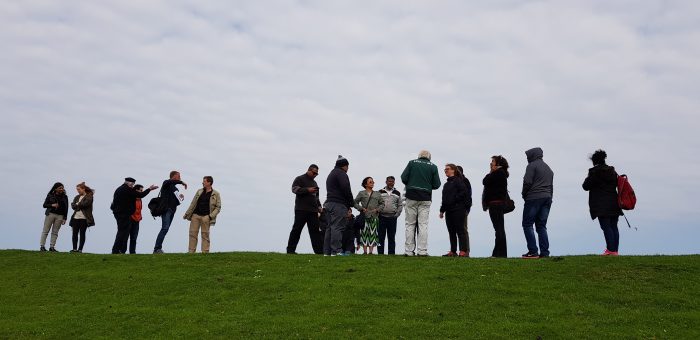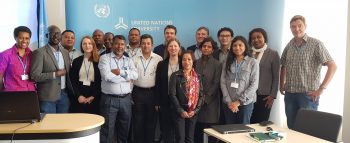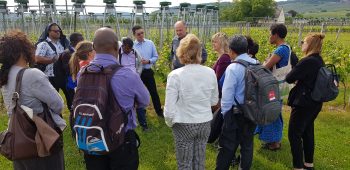
For many years Bread for the World together with its partners, and particularly through ACT Alliance’s advocacy work on climate justice, has supported and enabled communities to fight for changes in policy and practice to ensure that the most vulnerable communities are protected from the worsening impacts of climate change.
More often than not, the difference between a community’s resilience and complete devastation in the wake of intensified climate impacts and disasters is the availability of resources and the capacity to anticipate, prepare for and respond to these impacts in a timely manner. It is against this backdrop that ACT Alliance member Bread for the World (BfdW) organized a study tour around Germany for its partners from around the world.
The study tour brought together 16 BfdW partners from Fiji, Tuvalu, Solomon Islands, Bangladesh, Nepal, Tanzania, Ethiopia, India, and Philippines. The main objective of the study tour was to enhance the knowledge of BfdW partners on the technical, socioeconomic and political issues related to climate change adaptation, climate risk reduction, and climate risk insurance and risk financing in Germany.
The study tour visited some of Germany’s regions that are prone to and are frequently affected by extreme weather events including the city of Hamburg, the Island of Föhr in the North Sea, and the Island of Hooge in the Wadden Sea. Partners also met with decision makers, researchers, experts on climate related insurance and risk management, and with community leaders and people affected by extreme weather events.
During a tour of the flood protection initiative of Hamburg guided by Jan-Moritz Mueller from the city’s Flood Protection Unit, participants were informed of the various technologies and capacities that the city has invested in to enhance its resilience to flooding. The protection strategy which also includes an early warning system costs the city upwards of 50 million Euro per year.
“It is incredible to see the robust programmes and initiatives to address the risks and to reduce the impacts of the floods. What came to my mind immediately is the abundance of finances, knowledge and technology in this part of the world. This is what enables action,” said Frances Namoumou, one of the participants from the Pacific Conference of Churches in Fiji.
The visit to the islands of Föhr and Hooge particularly resonated with participants from small, climate vulnerable islands in the Pacific. Not only were the impacts of climate change familiar, but so were the stories from the communities living on the islands. During a local church meeting community members expressed their wishes of not having to leave their homes despite the risk of floods. “It was an eye-opener that climate induced displacement was an issue here as well, and what resonated very much was the fact that the people on these German islands do not want to leave their land, just like we do not want to leave ours,” said Frances.

Tetet Lauron from Ibon International in the Philippines related the connection between communities that are affected by climate change and other risks as a reaffirmation of our shared humanity. “It is interesting to see that people here face similar challenges and difficult questions that we face in our own countries. We have the shared human value of protecting ourselves and the ones that we love,” she said.
Rex Solo from the Solomon Islands was quick to notice the high level of adaptive and risk reduction infrastructures such as dykes, dunes and sea walls on the German Islands. “If there was a way to ensure that funding, technology and capacity could somehow reach us in our countries, then we could build our own adaptive capabilities,” he said.
Tetet further elaborated on the issue of differing country capacities, a concern that is shared by many developing countries. “There is a stark difference in capacity between a rich country like Germany and the countries that we come from. The inequality that we have seen in global development and specifically related to capacities and resources to address climate change is huge. While many of the issues that we face are similar, the difference is also massive”.
According to Vijeta Rattani from India, some of the technologies that she has seen on the tour could benefit people from her country. “There is still very little sharing of resources and capacities between developed and developing countries. This needs to be encouraged in the context of climate action and for the implementation of the Paris Agreement. In addition, some of the technologies could be adjusted so that we get low cost, accessible alternatives,” said Vijeta.
According to Sabine Minninger, Bread for the World’s climate change policy adviser, and the organizer of the study tour, “The main purpose of the study tour was to create a sense of solidarity between the North and South with the understanding that the impacts of climate change are the same.” Sabine continued, “The people from the Hooge and the people from Tuvalu are facing the same threats, the main difference is that Germany is a rich country and has the financial means to avoid the worst havoc even if the global temperature rises beyond 1.5 degree Celsius, while this will be life threatening for the people from Tuvalu.”
Recognizing this reality, ACT Alliance’s global climate justice work focuses on supporting and building the resilience of communities in developing countries. It also calls for developed countries to take responsibility and to provide leadership on climate action.
“All partners taking part in the study tour are involved in project work on the frontlines of climate change or in political advocacy work within the UN climate negotiations. Together, we continue to call for climate justice and for appropriate means of implementation from rich countries to the poor countries. Comparing the adaptation projects in Germany and seeing the suffering of the poorest people in Bangladesh clearly shows the lack of proportionality of access to technical support and finance for the poorest people to protect themselves,” said Sabine.

The study tour also presented the opportunity for partners to meet and engage with representatives from key German institutions that are pioneering policy and political approaches for addressing climate change, including climate insurance. Partners engaged with representatives from the German Federal Ministry for Economic Cooperation and Development, the G7/ G20 InsuResilience Secretariat, the Munich Climate Risk Insurance Initiative, and the German Bank for Reconstruction and Development (KfW). In addition, partners met representatives from the UNFCCC and also visited the Agricultural University of Geisenheim, where cutting edge research and development on adaptation in the context of Viniculture is currently underway.
Sophie Gebreyes, country representative of ACT Alliance member the Lutheran World Federation in Ethiopia said, “We are constantly experiencing humanitarian situations that are either induced or exacerbated by climate change. This study tour has been a wonderful opportunity for me to reflect on how a developed country like Germany is addressing these challenges and how we may be able to do the same in our own contexts.” Sophie added, “I had never met anyone from Tuvalu before.”
____
Written by Isaiah Toroitich, Global Advocacy and Policy Coordinator, ACT Alliance